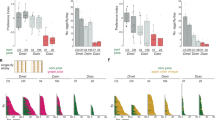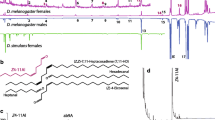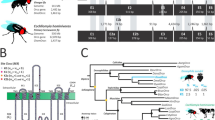Abstract
Selection of oviposition sites in insects represents an important part of their ecological adaptation. In Drosophila fruit flies, adult preference for a particular oviposition site determines larval food, affecting fitness throughout the entire life cycle. Two odorant-binding proteins (OBPs) OBP57d and OBP57e were identified to be involved in the evolution of specific preference for the toxic plant Morinda citrifolia L. in D. sechellia Tsacas & Bächli. D. melanogaster Meigen mutants for Obp57d and Obp57e showed enhanced preference for octanoic acid, but still not as much as D. sechellia does, indicating that other genes are also involved in the behavioral evolution of D. sechellia. Here, by using an improved method for behavioral assay, we found that the ablation of antenna enhanced the preference for octanoic acid in the Obp57d and Obp57e mutants to a level comparable with D. sechellia, suggesting that both olfactory and gustatory sensations are involved in oviposition site selection in response to octanoic acid. Behavioral analysis of gene-knockout strains revealed that Odorant receptor co-receptor (Orco) has little contribution compared with the effect of antennal ablation. These data suggest that in addition to Obp57d and Obp57e, the evolution of D. sechellia involves genetic changes in olfactory genes that function independently from Orco.




Similar content being viewed by others
References
Ai M, Min S, Grosjean Y, Leblanc C, Bell R, Benton R, Suh GSB (2010) Acid sensing by the Drosophila olfactory system. Nature 468:691–695. doi:10.1038/nature09537
Amlou M, Moreteau B, David JR (1998) Genetic analysis of Drosophila sechellia specialization: oviposition behavior toward the major aliphatic acids of its host plant. Behav Genet 28:455–464. doi:10.1023/A:1021689312582
Dworkin I, Jones CD (2009) Genetic changes accompanying the evolution of host specialization in Drosophila sechellia. Genetics 181:721–736. doi:10.1534/genetics.108.093419
Grosjean Y, Rytz R, Farine J-P, Abuin L, Cortot J, Jefferis GSXE, Benton R (2011) An olfactory receptor for food-derived odours promotes male courtship in Drosophila. Nature 478:236–240. doi:10.1038/nature10428
Harada E, Haba D, Aigaki T, Matsuo T (2008) Behavioral analyses of mutants for two odorant-binding protein genes, Obp57d and Obp57e, in Drosophila melanogaster. Genes Genet Syst 83:257–264. doi:10.1266/ggs.83.257
Harada E, Nakagawa J, Asano T, Taoka M, Sorimachi H, Ito Y, Aigaki T, Matsuo T (2012) Functional evolution of duplicated odorant-binding protein genes, Obp57d and Obp57e, in Drosophila. PLoS ONE 7:e29710. doi:10.1371/journal.pone.0029710
Hiroi M, Tanimura T, Marion-Poll F (2008) Hedonic taste in Drosophila revealed by olfactory receptors expressed in taste neurons. PLoS ONE 3:e2610. doi:10.1371/journal.pone.0002610
Inoshita T, Martin JR, Marion-Poll F, Ferveur JF (2011) Peripheral, central and behavioral responses to the cuticular pheromone bouquet in Drosophila melanogaster males. PLoS ONE 6:e19770. doi:10.1371/journal.pone.0019770
Jones CD (2005) The genetics of adaptation in Drosophila sechellia. Genetica 123:137–145. doi:10.1007/s10709-004-2728-6
Joseph RM, Devineni AV, King IFG, Heberlein U (2009) Oviposition preference for and positional avoidance of acetic acid provide a model for competing behavioral drives in Drosophila. Proc Nat Acad Sci 106:11352–11357. doi:10.1073/pnas.0901419106
Koganezawa M, Haba D, Matsuo T, Yamamoto D (2010) The shaping of male courtship posture by lateralized gustatory inputs to male-specific interneurons. Curr Biol 20:1–8. doi:10.1016/j.cub.2009.11.038
Kopp A, Barmina O, Hamilton AM, Higgins L, McIntyre LM, Jones CD (2008) Evolution of gene expression in the Drosophila olfactory system. Mol Biol Evol 25:1081–1092. doi:10.1093/molbev/msn055
Larsson MC, Domingos AI, Jones WD, Chiappe ME, Amrein H, Vosshall LB (2004) Or83b encodes a broadly expressed odorant receptor essential for Drosophila olfaction. Neuron 43:703–714. doi:10.1016/j.neuron.2004.08.019
Legal L, Chappe B, Jallon JM (1994) Molecular basis of Morinda citrifolia (L.): toxicity on Drosophila. J Chem Ecol 20:1931–1943. doi:10.1007/BF02066234
Matsuo T (2008) Genes for host-plant selection in Drosophila. J Neurogenet 22:195–210. doi:10.1080/01677060802298483
Matsuo T, Sugaya S, Yasukawa J, Aigaki T, Fuyama Y (2007) Odorant-binding proteins OBP57d and OBP57e affect taste perception and host-plant preference in Drosophila sechellia. PLoS Biol 5:985–996. doi:10.1371/journal.pbio.0050118
Miyamoto T, Amrein H (2008) Suppression of male courtship by a Drosophila pheromone receptor. Nat Neurosci 11:874–876. doi:10.1038/nn.2161
Yasukawa J, Tomioka S, Aigaki T, Matsuo T (2010) Evolution of expression patterns of two odorant-binding protein genes, Obp57d and Obp57e, in Drosophila. Gene 467:25–34. doi:10.1016/j.gene.2010.07.006
Acknowledgments
This work was supported by Grant-in-Aid for Young Scientists (A) 21688003 from Japan Society for the Promotion of Science to TM.
Author information
Authors and Affiliations
Corresponding author
Rights and permissions
About this article
Cite this article
Matsuo, T. Contribution of olfactory and gustatory sensations of octanoic acid in the oviposition behavior of Drosophila melanogaster (Diptera: Drosophilidae). Appl Entomol Zool 47, 137–142 (2012). https://doi.org/10.1007/s13355-012-0100-3
Received:
Accepted:
Published:
Issue Date:
DOI: https://doi.org/10.1007/s13355-012-0100-3




